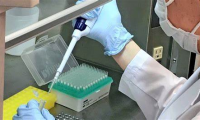-
Multiplexed PCR Test for Pathogen Detection and Antibiotic Resistance Helps Deliver Rapid UTI Treatment
- Source: drugdu
- 388
- February 10, 2024
-
AbbVie’s full year 2023 sees 6.4% net revenue drop
- Source: drugdu
- 350
- February 10, 2024
-
Novo Holdings acquires Catalent for $16.5bn
- Source: drugdu
- 292
- February 10, 2024
-
RegenxBio advances two candidates to make waves in the CNS space
- Source: drugdu
- 555
- February 9, 2024
-
Reuters
- Source: drugdu
- 278
- February 9, 2024
-
Novartis CEO’s 2023 pay rises 21% as Roche’s helmsman nets $11M in his first year
- Source: drugdu
- 553
- February 9, 2024
-
FDA and EMA team up to expedite complex generic drug development
- Source: drugdu
- 278
- February 8, 2024
-
Pfizer Teams With American Cancer Society to Reduce Cancer Care Disparities
- Source: drugdu
- 423
- February 8, 2024
-
Telix to acquire QSAM Biosciences for $123.1m
- Source: drugdu
- 321
- February 8, 2024
-
Point-Of-Care Tool Diagnoses Genetic Mutations within Hours
- Source: drugdu
- 290
- February 8, 2024
your submission has already been received.
OK
Subscribe
Please enter a valid Email address!
Submit
The most relevant industry news & insight will be sent to you every two weeks.

















